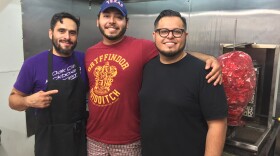In 2018, tacos seem as American as hamburgers and apple pie. If you trace the taco’s path to the states, you’d discover the rich history of the people who brought them here.
St. John’s University assistant professor of English Steven Alvarez covers these ideas in a popular course he teaches called “Taco Literacy,” which combines field trips to taquerias and Latino food establishments with scholarship and cultural exploration.
He joined host Krys Boyd on KERA’s Think on Wednesday to talk about what can be learned about Mexican and Latino culture through the food that has been shared.
Interview Highlights
On the history of the tortilla
The history of the tortilla encapsulates so much about Mexican history. The distinction between flour and corn is one that goes back to Mexican colonial history — the Conquest, when Spanish invaders brought flour to create a kind of flatbread. However, there was always a distinction between corn, used by indigenous communities and then flour, [used] principally in the northern parts [of Mexico,] where my family’s from, the state of Sonora, for example.
After the interview about #TacoLiteracy @LosTacosNo1 pic.twitter.com/Wwl3Dwz9iI
— Steven Alvarez (@Chastitellez) January 17, 2018
The tradition of a tortilla as a flatbread is just really rich to think about — the multiplicity of ways it can be used in cuisine. It is really one of the gifts of Meso-American civilization to the Americas, and to the world. There’s so much we can really think about historically with tortillas but also how the tortilla has formed a wall between people, particularly indigenous and those mestizo folks of more European blood.
On the legitimacy of Taco Bell
I wouldn’t say it’s necessarily a problem. It’s a part of the history. I think the bigger problem might be if you actually look into the history. The Mitla Café [in San Bernardino] is really the restaurant that developed the kind of taco Glenn Bell later took over and mass produced — perhaps even, say, appropriated. But so much of the restaurant industry is about appropriation. Really, that Taco Bell taco is legitimate. It does exist. It’s exported worldwide. It’s a billion-dollar taco. But it’s an American taco. It’s a fast-food version of Mexican food. It’s really American fast food. Folks may have their issues with it, but I think there is something to be said that that is a part of American fast food cuisine that builds off Mexican influence.
https://vimeo.com/190936071">The Mitla Cafe from https://vimeo.com/user20917229">Katrina Parks on Vimeo.
On being proud of his culture’s food
I remember going to school, and of course, I had my “Return of the Jedi,” lunchbox. I had my standardized thermos and the actual lunchbox, but then my mother never packed me a sandwich. She was always packing me “bean burros,” or bean burritos. All the other kids I sat by had sandwiches, and I remember taking out my lunch and just being ashamed. I really sort of tried to hide under the table while I ate my burrito, and I asked my mom, “Can you please make me a sandwich?” just because I didn’t want to stick out. Also, I think there was some self-consciousness arriving about my Mexican identity among students who were not.
"Being proud of our food is something we should honor."
Later on in high school, my mom would sometimes drop me off a lunch. [One] had green chile burritos. These were green chile burritos she had bought from a local deli. And of course, it would smell up the room; it was hatch green chile. And some of the students started asking me to switch lunches: “I’ll trade you this sandwich for your burrito.”
The burrito I was ashamed of was not so much the burrito, but it was my “Mexicaness,” my Mexican identity. I didn’t see myself reflected in the teachers, for example, the politicians who were around me, or the people of power. I saw folks who were like my parents, who were custodians, people who worked hard, but never at the front of the classroom. And that’s something that, students of color, we internalize. We notice that, and that’s important to address as well. But more importantly, being proud of our food is something we should honor.
Book recommendations
Here are five books Alvarez mentioned during his conversation on "Think."
- “Taco USA: How Mexican Food Conquered America” by Gustavo Arellano
- “Planet Taco: A Global History of Mexican Food” by Jeffrey M. Pilcher
- “Tacopedia” by Deborah Holtz
- “Tortillas: A Cultural History” by Paula E. Morton
- “Community Literacies en Confianza: Learning from Bilingual After-School Programs” by Steven Alvarez
To listen to the entire Think interview, stream it or download the podcast.
Interview responses have been edited for clarity and length.



